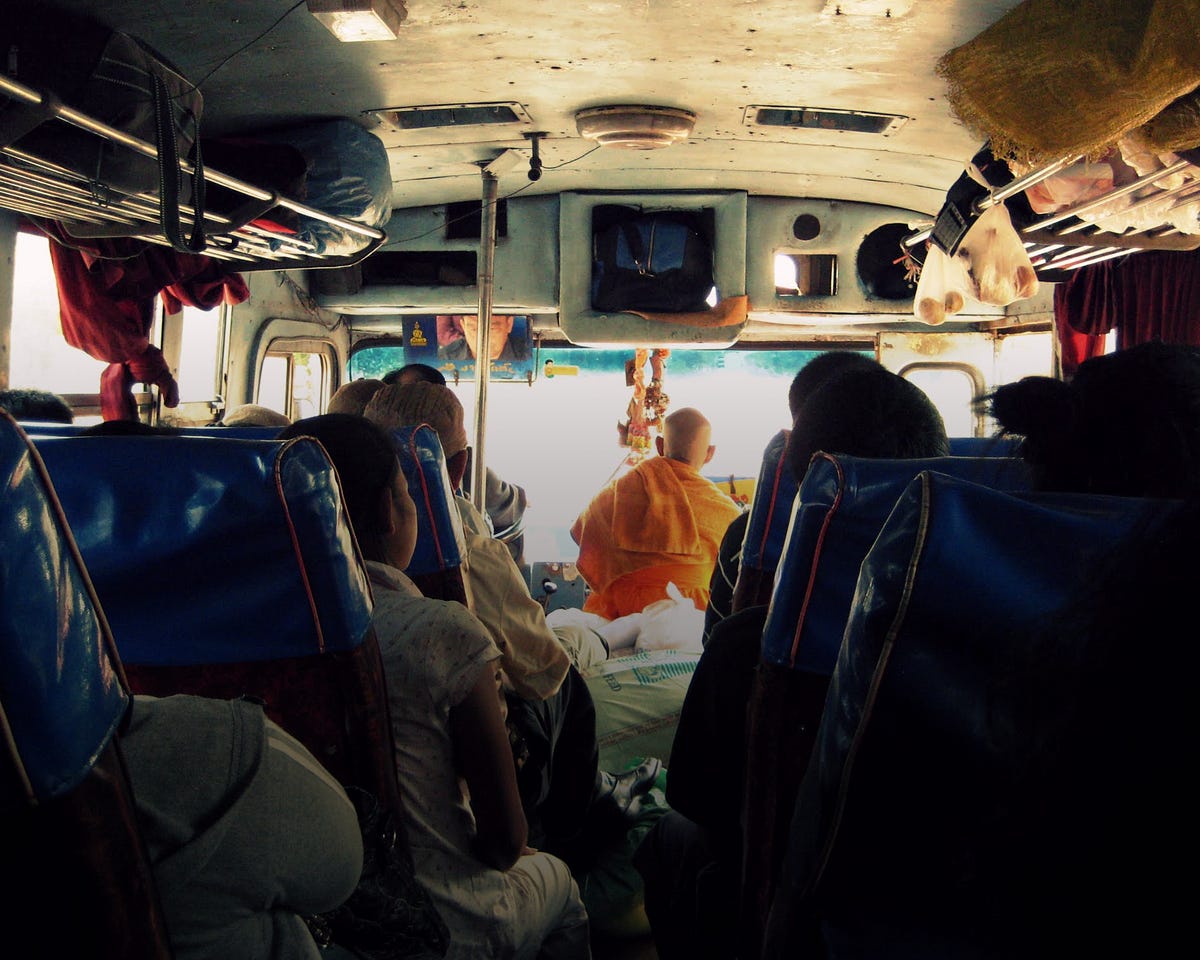Mobile Love

A stream of Daft Punk helmeted motorcyclists zip past, the single traffic light reflected as a jagged lipstick red smear in their mirrored visages. They lean hard to avoid the bus. Kick up dust. I give my window a half-hearted tug, but it is wedged open, and the tiny half curtains ripple in the morning breeze. The dust has shaded the walls of the houses facing us burnt ochre, and on one huge letters spell, “Welcome” and “LOVE” in lazy broken loops of white spray-paint. We are angled diagonally across the intersection, stuck behind a teetering pile of wooden wardrobes being drawn by a vehicle that resembles the result of a drunken tryst between ride-on lawnmower and bullock cart.
Emerging from the stalls that line the road, snack food vendors use the opportunity of a halt in motion to push their way through the swarm of old women negotiating the loading of a stack of chairs, and step up onto the bus. The driver and conductor share a brief exchange as the light changes to green, and manoeuvre the bus past wardrobes, escaped chickens, and stacks of wilting vegetables, before returning to their primary conversations on respective mobiles. The last stack of tightly-bound red plastic chairs is heaved onto the roof with a clatter and the women push forward to climb aboard. Inside the bus, vendors weave their way up and down the aisle, tiny chickens splayed wide across single skewers, glistening with honey and oil. The couple in front of me haggle for chicken livers with a girl who cannot be more than fifteen years old.
On the other side of the road, behind a perfectly level fence that does not quite reach the ground, sits a chipped and colourless temple. It is straddled by an equally chipped and colourless concrete Buddha, with prominent nipples and a beatific gaze that takes in the shabby wooden lodgings scattered around him like discarded children’s toys. An old monk, hand holding his glasses against his nose, and waving frantically to catch the driver’s attention, begins to head in our direction. As he crosses the courtyard in front of the wat, three novitiates, orange-robed and running, converge on the shuffling older man. First a bag is slipped over one shoulder, a water bottle pressed into a waiting hand, and a sheaf of bank notes slipped into a pouch around his neck. At the threshold, they stop and stand in a line, grinning.
The monk steps aboard and stops, blinks, and for a moment looks concerned. As if only just learning where he is, he pats the pouch at his side, and begins rifling urgently through its contents. Papers and water are held, chin to chest, as he rummages through the bag. Finally, he smiles, nods, and withdraws a crumpled packet of cigarettes and a battered phone. He waves at the trio of shaven-headed, saffron-robed youngsters and begins to shuffle to the back of the bus, before being instructed by the driver to ride shotgun, up front, robes curling around the gear stick.
Ever since we set off, the TV mounted to the front dash has played karaoke, and the video to every song is a slight variation on the same story: a woman, who works in a restaurant, stares wistfully at her mobile, waiting for it to ring. We cut to the love interest who is busy in his inevitably solid and respectable job: smashing rocks into smaller rocks, delivering large bottles of water, or welding something to something else. There are several close-ups of his mobile, sitting just out of sight. Perhaps it has slipped out of his pocket, or between the seats of his car. It is ringing, and he cannot hear it.
She is lost, unsure what to do, and so she rings again. And again. When it seems all is lost, and our girl is stumbling through the rain-lashed streets, crying, the phone will ring. We see it again, close, and it is definitely his name, and suddenly he’s there with an umbrella, and an easy smile, and they duck into a restaurant so that she can look bashful as she feeds him a spoonful of noodles. Their phones rest against each other on the table, together at last. These bricks of plastic are the stars of this show, and the people surround them mere props, useful only in bringing them together.
The girl with the livers has failed to convince the couple in front that they represent a sensible investment, and so she scrambles to the front to step down and off. Her hands and face are streaked with the red black dirt that covers everything, and there are shining streaks where the fat from the chicken has run down her arms. As she nears the steps her pocket begins to ring, and she hands her skewers to a friend and pulls a phone from her jumper.
The wind has kicked up again. The sting of dust particles prickles against my cheek, and clumps of plastic press against the bus, then drop to the ground, lifeless. There will be no rain today, and restaurants in this part of the country are few and far between, but I wonder who is on the other end of the line. If she has a water delivery man of her own and if their mobiles huddle together at night, waiting for their time in the spotlight.
